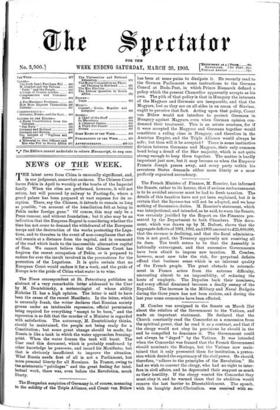The French Minister of Finance, M. Rouvier, has informed the
Senate, rather to its horror, that if serious embarrassment is to be avoided recourse must be had to fresh taxation. The details of this taxation have not yet been explained, but it is certain that the Income-tax will not be adopted, and we hear nothing of Succession-duties. M. Rouvier's statement, which was interjectional, and intended, as he said, to warn the Senate, was certainly justified by the Report on the Finances pre- sented by the Department to both Chambers. This docu- ment, which was drawn up by M. Dubost, shows that the aggregate deficits of 1901,1902, and 1903 amount to 225,600,000, that the revenue is declining, and that the fiscal administra- tion is not good, the Treasury apparently not receiving all its dues. The truth seems to be that the Assembly is habitually extravagant, and that successive Governments have been afraid to impose new taxation. M. Combes, however, must now take the risk, for perpetual. defioits offend that business sense which is an inherent quality of the French people. The great obstacle to retrench- ment in France arises from the extreme difficulty, amounting almost to an impossibility, of reducing the hosts of employes. The Deputies back their nominees, and every official dismissed becomes a deadly enemy of the Republic. The increase in the Military and Naval Budgets during the three years has not been serious, and during the last year some economies have been effected.










































